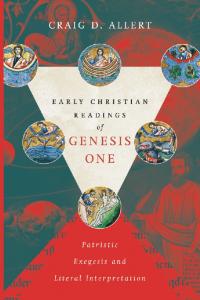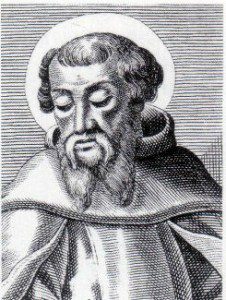 Isn’t the Bible enough?
Isn’t the Bible enough?
Well yes, but the two are not really separable.
I recently received a copy of a new book Early Christian Readings of Genesis One by Craig D. Allert due for release July 24th. The opening chapter of the book immediately caught my eye: Who are the Church Fathers and Why Should we Care? A great question – and Allert provides some great insights. The Protestant approach, at least for many of us, is rooted in sola scriptura – Scripture alone. There is an impression that our faith is founded on a book, a divine gift from above.
This isn’t exactly accurate though.
The canon of the New Testament was not settled until late in the fourth century AD and even this cannot be considered an absolutely firm date. It did not appear out of nowhere, but developed in the context of the church as the leaders considered the available writings and settled on those considered authoritative. That the Holy Spirit guided this process doesn’t change the human involvement or the role of the church. Faithful followers prayerfully considered the possible documents for inclusion.
 What were the criteria? The most significant criterion is the rule of faith that Irenaus (ca. 130-202 AD) outlines in Against Heresies written sometime between 174 and 189 AD. (Source: Book 1, Ch. X CCEL)
What were the criteria? The most significant criterion is the rule of faith that Irenaus (ca. 130-202 AD) outlines in Against Heresies written sometime between 174 and 189 AD. (Source: Book 1, Ch. X CCEL)
The Church, though dispersed through our the whole world, even to the ends of the earth, has received from the apostles and their disciples this faith:
[She believes] in one God, the Father Almighty, Maker of heaven, and earth, and the sea, and all things that are in them;
and in one Christ Jesus, the Son of God, who became incarnate for our salvation;
and in the Holy Spirit, …
and the birth from a virgin, and the passion,
and the resurrection from the dead,
and the ascension into heaven in the flesh of the beloved Christ Jesus, our Lord,
and His [future] manifestation from heaven in the glory of the Father “to gather all things in one,” and to raise up anew all flesh of the whole human race, in order that to Christ Jesus, our Lord, and God, and Saviour, and King, according to the will of the invisible Father, “every knee should bow, of things in heaven, and things in earth, and things under the earth, and that every tongue should confess” to Him,
and that He should execute just judgment towards all; that He may send … the ungodly, and unrighteous, and wicked, and profane among men, into everlasting fire; but may, in the exercise of His grace, confer immortality on the righteous, and holy, and those who have kept His commandments, and have persevered in His love, … and may surround them with everlasting glory.
As I have already observed, the Church, having received this preaching and this faith, although scattered throughout the whole world, yet, as if occupying but one house, carefully preserves it. …For, although the languages of the world are dissimilar, yet the import of the tradition is one and the same. … But as the sun, that creature of God, is one and the same throughout the whole world, so also the preaching of the truth shineth everywhere, and enlightens all men that are willing to come to a knowledge of the truth.
In his writings Irenaeus quoted from many of the writings in our New Testament and considered them authoritative, useful for study and teaching; but this rule of faith was the standard against which writings were tested. The writings that contradicted this rule of faith revealed themselves to be heretical.
Allert gives an example from Eusebius where a Bishop contemporary with Irenaeus first approved of a church under his jurisdiction using The Gospel of Peter supposedly attributed to Peter. When he read it, however, he judged it heretical because it contradicted the rule of faith – it denied the incarnation, Jesus’ human nature.
The rule of faith and the church played an essential role, although Allert notes:
This does not mean that Christian writings (both canonical texts and other orthodox documents) were unimportant or irrelevant during the second and third centuries. Quite the opposite, they were a vital part of a canonical heritage. But before there was a New Testament canon, there existed a rule of faith that, along with leaders of the early church, functioned as the guardian of proper doctrine. (p. 29)
But the heritage is significant, and the church today still guards orthodoxy conforming to the ancient rule of faith. It goes even further:
…by accepting the Bible as authoritative we must also accept the process and means through which it came to be – we are operating within this broader context in which the Fathers, as leaders of the church, were major players. (p. 32)
The Apostles’ Creed flows better than the paragraph in Against Heresies by Irenaeus, but the major points are the same. It is thoroughly biblical because it is, in essence, a major criterion by which orthodoxy was judged. Low church Protestants who eschew the Apostles’ Creed and argue against recital, claiming to stand on Scripture alone should probably think again.
I believe in God the Father almighty, maker of heaven and earth, and in Jesus Christ his only Son our Lord, who was conceived by the Holy Spirit, born of the Virgin Mary, suffered under Pontius Pilate, Was crucified, dead, and buried. He descended into hell; the third day he rose again from the dead; he ascended into heaven, and is seated at the right hand of God the Father Almighty; from thence he shall come to judge the quick and the dead. I believe in the Holy Spirit; The holy catholic church, the communion of saints; the forgiveness of sins; the resurrection of the body, and the life everlasting.
We stand on the shoulders of the Early church Fathers (and Mothers).
Comments?
If you wish to contact me directly you may do so at rjs4mail[at]att.net
If interested you can subscribe to a full text feed of my posts at Musings on Science and Theology.











